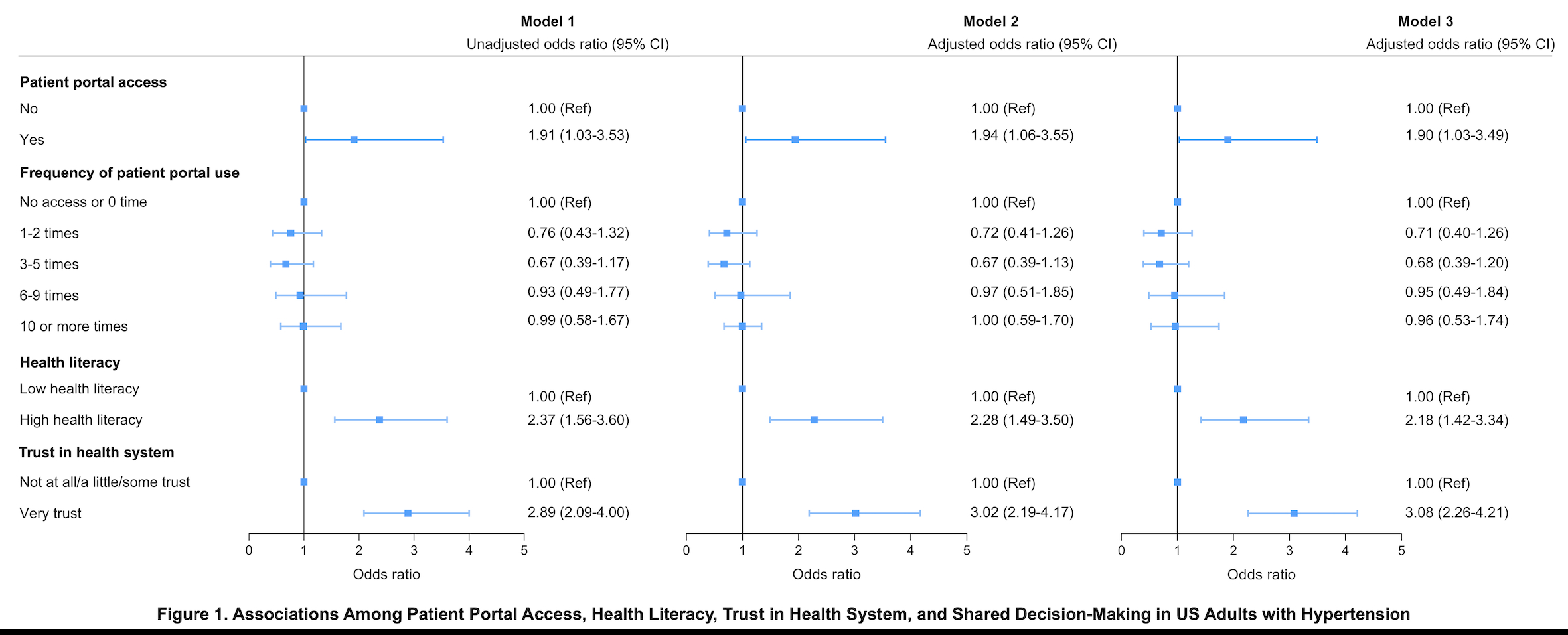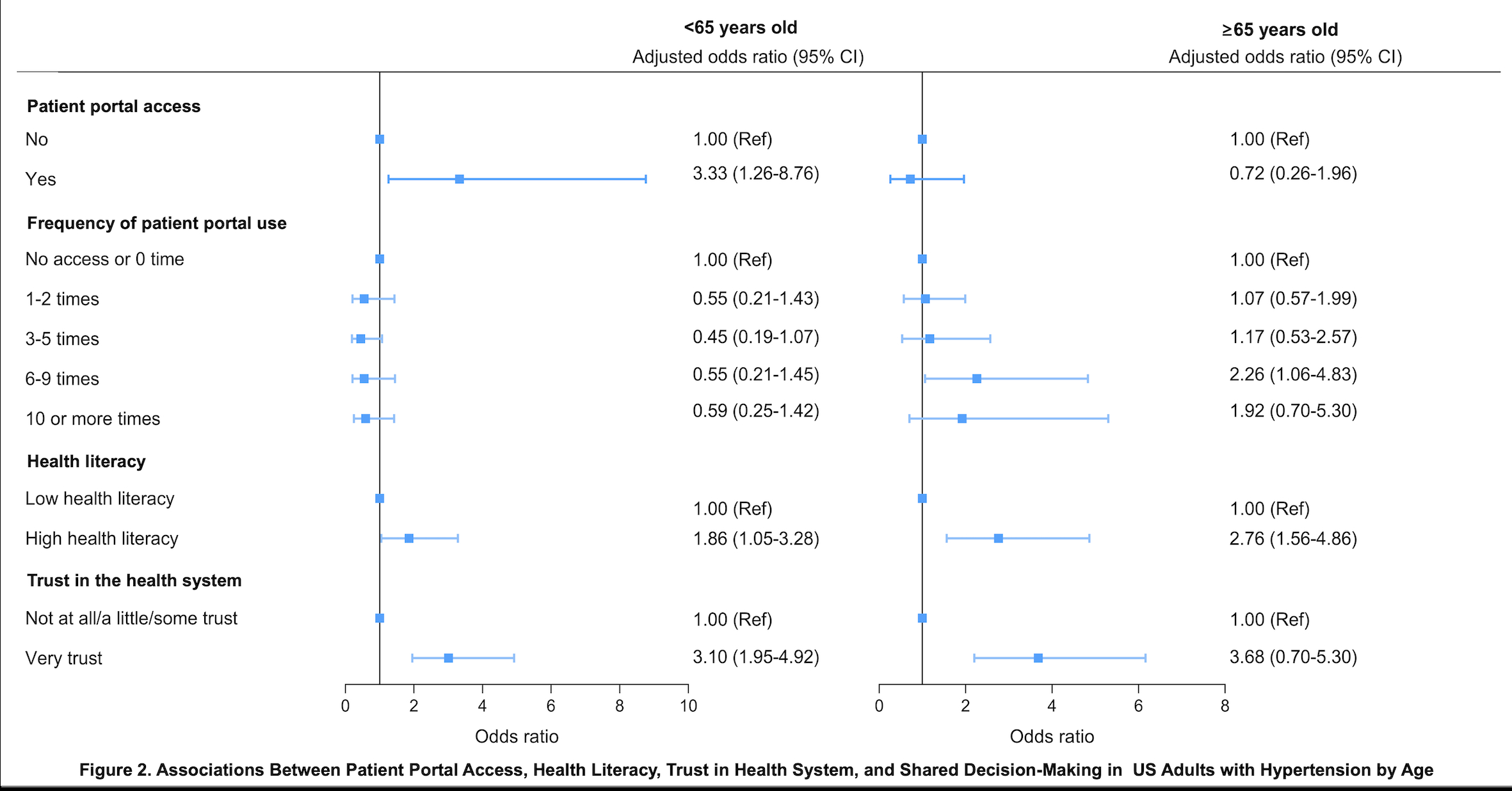Final ID: P-185
Patient Portal Access, Health Literacy, Patient Trust in Health System, and Shared Decision Making Among US Adults with Hypertension: A National Cross-Sectional Study
Abstract Body: Background: Shared decision-making (SDM) is increasingly recognized as central to delivering patient-centered care and improving hypertension control. However, there is limited understanding of the association between patients' access to patient portals, health literacy, trust in the health system, and involvement in SDM.
Objectives: This study investigated the associations between patients' access to patient portals, health literacy, trust in the health system, and patients’ involvement in SDM among adults with hypertension in the United States (US).
Methods: This cross-sectional study utilized data from the 2022 Health Information National Trends Survey (HINTS 6) conducted among US adults. The exposure variables were patient portal use, health literacy, patients' trust in health systems, and whether the participant was offered access to patient portals by healthcare providers. The outcome of interest was whether patients were always involved in SDM (Yes/No) during the past 12 months. Analyses were weighted according to HINTS 6 methodology. We performed three weighted sequential multivariable logistic regression models (Fig. 1, Models 1-3). The fully adjusted model included demographics, clinical characteristics, and social determinants of health and resources for implementing SDM and was stratified by age (<65 and ≥65 years).
Results: We included 1703 adults with hypertension (mean age of 61.6, SD 13.9 years; 52.5% male; and 64.9% White adults). About 86.4% of participants were offered online access to patient portals by their healthcare providers. In the fully adjusted model (Fig. 1, Model 3), adults who were offered access to patient portals (adjusted odds ratio [aOR] 1.90, 95% CI 1.03-3.49), with higher health literacy levels (aOR 2.18, 95% CI 1.42-3.34), and with higher trust in health systems (aOR 3.08, 95% CI 2.26-4.21) were more likely to engage in SDM than their counterparts. These associations were similar among adults <65 years (Fig. 2). However, among adults ≥65 years, offering online access to patient portals was not associated with involvement in SDM; while those who used the patient portal 6-9 times during the past 12 months were more likely to engage in SDM than those who never used it (aOR 2.26, 95% CI 1.06-4.83).
Conclusion: Offering access to patient portals may enhance SDM among US adults with hypertension, especially for adults with higher health literacy levels and greater trust in health systems. These associations differed by age.
Objectives: This study investigated the associations between patients' access to patient portals, health literacy, trust in the health system, and patients’ involvement in SDM among adults with hypertension in the United States (US).
Methods: This cross-sectional study utilized data from the 2022 Health Information National Trends Survey (HINTS 6) conducted among US adults. The exposure variables were patient portal use, health literacy, patients' trust in health systems, and whether the participant was offered access to patient portals by healthcare providers. The outcome of interest was whether patients were always involved in SDM (Yes/No) during the past 12 months. Analyses were weighted according to HINTS 6 methodology. We performed three weighted sequential multivariable logistic regression models (Fig. 1, Models 1-3). The fully adjusted model included demographics, clinical characteristics, and social determinants of health and resources for implementing SDM and was stratified by age (<65 and ≥65 years).
Results: We included 1703 adults with hypertension (mean age of 61.6, SD 13.9 years; 52.5% male; and 64.9% White adults). About 86.4% of participants were offered online access to patient portals by their healthcare providers. In the fully adjusted model (Fig. 1, Model 3), adults who were offered access to patient portals (adjusted odds ratio [aOR] 1.90, 95% CI 1.03-3.49), with higher health literacy levels (aOR 2.18, 95% CI 1.42-3.34), and with higher trust in health systems (aOR 3.08, 95% CI 2.26-4.21) were more likely to engage in SDM than their counterparts. These associations were similar among adults <65 years (Fig. 2). However, among adults ≥65 years, offering online access to patient portals was not associated with involvement in SDM; while those who used the patient portal 6-9 times during the past 12 months were more likely to engage in SDM than those who never used it (aOR 2.26, 95% CI 1.06-4.83).
Conclusion: Offering access to patient portals may enhance SDM among US adults with hypertension, especially for adults with higher health literacy levels and greater trust in health systems. These associations differed by age.
More abstracts on this topic:
Association of Blood Pressure Control with Distance to Parameters of Social Determinants of Health
Zehra Anum, Huang Shuo Jim, Aktay Sinan, Lyalomhe Ozi, Maron Bradley, Mccoy Rozalina
A cerebrovascular longitudinal atlas: different rates of morphological change in aneurysm patients associated with hypertension and diabetesChien Aichi, Salamon Noriko, Vinuela Fernando, Szeder Viktor, Colby Geoffrey, Jahan Reza, Boyle Noel, Villablanca Juan, Duckwiler Gary


